4 Families Share What it Was Like to Relocate During the Pandemic
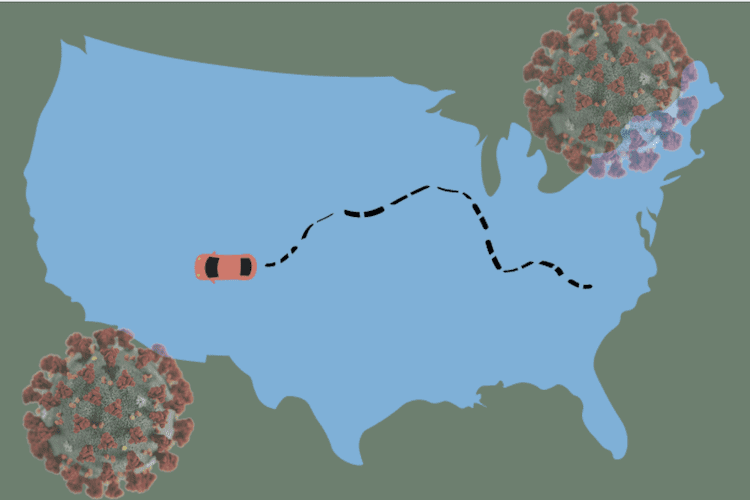
From the onset of the coronavirus pandemic, official guidance on how to stop the spread was unclear. Very few rules were universal, and things like masks became polarized. One of the few rules that existed in March that is still critical today is to avoid travel whenever possible. Many major cities ordered people to shelter in place, and millions of Americans stayed firmly indoors for weeks or months. But not everyone had that luxury.
For a number of reasons, many people were forced to relocate and restart. Some went back to live with their parents, others moved to more affordable areas. Some even packed up into an RV and set off across the country.
Moving your life from one place to another is stressful. That’s true even without a global pandemic raging while you’re navigating the move. This year, many people were forced into uncomfortable, uncertain circumstances, but handled them with courage and optimism. These are a few stories from families we chatted with that relocated as a result of the pandemic.
Family Strength
Corritta and her family left the country in August after she lost her job over the summer. She, her wife, and their son moved to Mexico, where she began focusing on their family travel blog, It’s A Family Thing.
“We needed to figure out how to make money during this time because I couldn’t find a job, and the future was looking bleak,” she said. “The mental aspect of not having a job and scaling back your lifestyle is an initial shock, but it is also liberating. I can spend time with our 2-year-old son and truly be involved in his life, not just a few hours a day after work.”
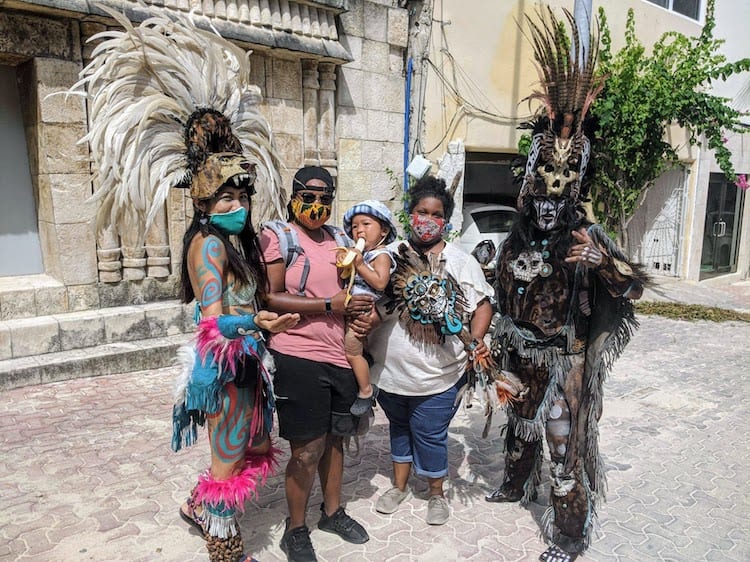
Corritta’s income has not yet fully returned to its pre-pandemic levels, but she’s spent more time with her family and said that the blog is growing steadily. The move to another country was scary, but it has been manageable thanks to lower expenses and Corritta setting her own hours. She said that in Mexico, their expenses are about 75 percent lower than they were in the U.S., and health care, in particular, is far more affordable.
“Although not making the money I was before is hard, the time I get with my family is invaluable now that I can make my own schedule,” she said.
And even though living in a foreign country was an adjustment, Corritta said she and her family feel comfortable and safe.
“Our anxiety and stress are at an all-time low here,” she said. “Being in another country isn’t as scary as we thought it would be, although it is different, the adventure is worth it.”
From the City to Suburbia
One of the few bright spots for many families forced to uproot – like Corritta’s – has been the opportunity to spend time together. Like Ashley – a committed city dweller living near Boston’s Logan Airport – who was out of work on maternity leave, but had no eyes for the suburbs until the pandemic hit.
“I was one of those people that said I would never leave the city. We even moved to the suburbs once and I made us sell our house within a year to move back to the city,” she said.
“But then I had a small little baby during a pandemic, living in a condo building filled with pilots and flight attendants […] and was forced to go in and out of elevators at all hours with my baby and dog while my husband was (still) traveling for work. It changed things.”
Ashley and her family sought more space and seclusion and settled in the suburbs of Rhode Island. As soon as she landed in her new town, which she described as “Pleasantville,” her old job in the city became an afterthought. Ashley left her job via Zoom after seven years and began working with her sister-in-law, who lived nearby.
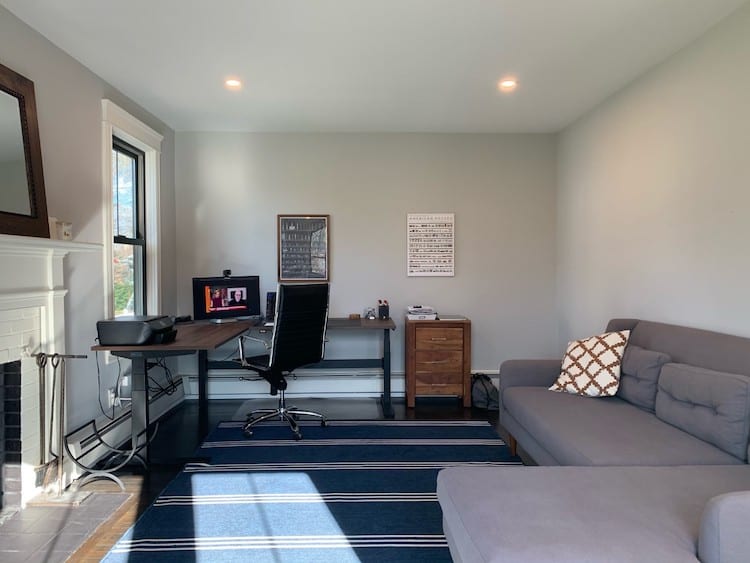
The process hasn’t been seamless. For instance, home inspections and daycare scouting become much more difficult amid a pandemic. However, Ashley has found joy in her revamped life and said she’s happier at the end of the day now than she used to be.
“I have had the opportunity to witness my son grow up and see way more than I ever would have,” she said. “We love our new house and can gladly say we won’t be moving back to the city.”
Cross Country on the Road
Throughout the pandemic, city dwellers have been eager to leave metropolitan areas, but the question of where to go next becomes a major issue. For Kelly Burch – a writer at TrulyMama – and her family, the answer was simple: go everywhere.
“In August, after it became clear that the 2020-2021 school year would look nothing like normal for our first-grade daughter, my husband and I decided to do something dramatic,” she said. “We bought an RV motorhome and set out on an open-ended road trip around America.”
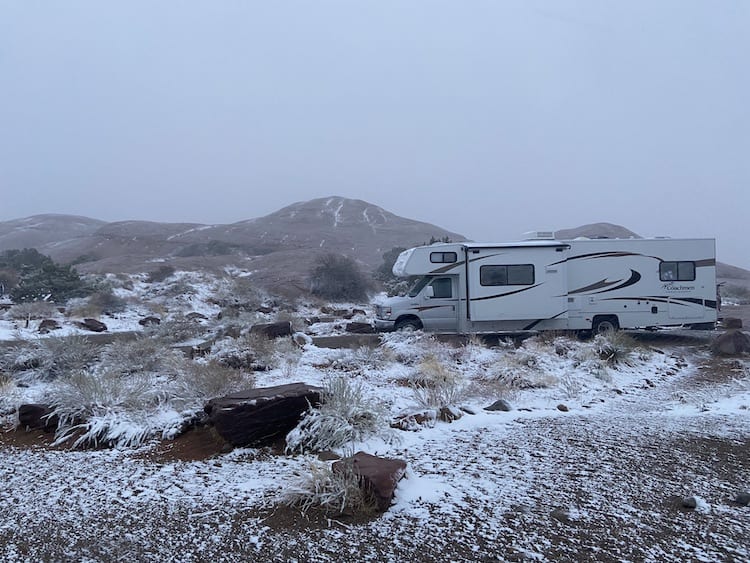
Since hitting the road, she and her family – her husband, daughters 6 and 2, and their dog – have driven close to 7,000 miles, trekking from New Hampshire to California across 10 weeks. The coast-to-coast trip has had its ups and downs, but overall Burch said the experience has been positive.
“There have certainly been challenges: some attractions that we’d like to see — like caves in the national parks system — are closed,” she said. “Homeschooling is a lot less formal than it would be ideally. However, we’re brimming with pride about the adventures that we’ve had and the fact that we had the guts to try something unusual.”
To stay on top of the family’s finances, Burch uses YouNeedABudget, a personal budgeting software. Overall, though, the family has covered the costs of traveling by renting out their home through Airbnb, and mitigating expenses like dining out and daycare.
Perhaps above all else, by staying isolated together and traveling, Burch said the experience has been amazing for her family amid grim circumstances.
“While the pandemic and its fallout have been horrific, it’s been a blessing for my family to be able to spend quality time with each other and see the country from sea to shining sea.”
From Cali to Florida
Like Burch who drove from the east coast to the west, Anja Lill was forced to make the reverse journey. Lill – who runs MyLaptopHome.com – her husband, and their 7-month-old daughter lived in Los Angeles, but she was out of work and the rent prices were high.
Her in-laws offered the family to come stay with them near Orlando, but Lill had to get out of her apartment contract first. Lill said their landlord hit them with “exorbitant” fees before they were allowed to leave, but by the end of June, they were out.
“With an infant and a cat in tow, we had less than 5 weeks to pack up our entire belongings and figure out how to move across the country during the pandemic,” she said. “I had lived in LA for 10 years so needless to say I never saw myself move anytime soon, especially not this suddenly.”
Lill packed up what she could fit into one U-Haul U-Box and sold or donated anything that couldn’t fit. That meant all their furniture. Before moving out, she said she and her family shared one last meal on the floor of their now-empty apartment.
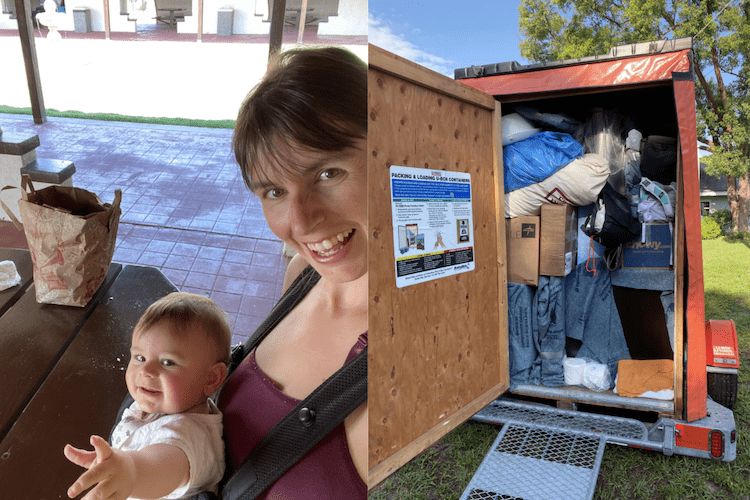
They considered renting an RV, but a rental car and hotel visits proved a better option. While the family wasn’t keeping on a tight budget, Lill said they expected to spend about $5,000 traveling. The RV alone cost $2,000, so Lill found a great deal on a rental car through Orbitz instead.
The family set off from LA on the weekend before July 4th and spent a week on the road. Their first stop was Phoenix, Arizona, then Van Horn, and Austin, Texas. They paused in Austin for three days at a friend’s house, while her husband worked remotely. From there, they drove through Baton Rouge and Tallahassee before arriving outside Orlando. In total, the trip was around 2,500 miles. Ultimately, the family spent about $5,000 along the way, roughly what they had planned to.
“It was no easy feat especially since our daughter all of a sudden did not like the new car seat we had gotten her,” Lill said. “We are extremely proud that we managed to do the entire move within such a short time frame with such uncertainties – and that it ended up working out so beautifully by splitting up the trip into doable chunks.”
The Bottom Line
For just about anyone, moving during a pandemic is a difficult process. This year, poor virus control and subpar government relief have left many Americans unsafe or unstable financially, forcing many into situations where they needed to relocate. Despite the situation, many people found comfort in their family and made the most of the journey.









